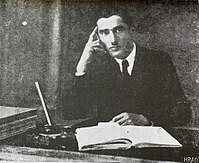Nuri Dersimi
Mehmet Nurî Dersimî (* 1893 in Dersim , today Tunceli , † August 22, 1973 in Aleppo ) was an Alevi - Kurdish politician and leader.
Live and act
He was born in 1893 in the village of Axzonike in what was then Dersim . He attended primary school in Hozat in 1899 , and secondary school in Harput in 1905 . In 1911 he began studying veterinary medicine in Istanbul . There he became a member of the Kurdish association Hevi-Kürt Talebe Cemiyeti (Hope Association of Kurdish Students) and in 1912 even secretary of the Kurdistan Muhibban Cemiyeti . During the First World War he was called up as a veterinarian by the Ottoman government and sent to Erzincan in 1914 . In Erzincan he was an eyewitness to massacres of Armenians . Because of political activities he was transferred to Kangal in Sivas in 1916 . There he married Sevli, the daughter of an Agha . Shortly afterwards he was sent to Giresun . In 1918 he returned to Istanbul and finished his studies.
After completing his studies, Dersimi went back to Sivas and helped organize the Koçgiri uprising in 1920. Dersimi became an important figure in the uprising and adviser to Said Rıza . After the Koçgiri uprising, he went to Dersim. He was also involved in the first Dersim uprising. But he lost three of his brothers and his son Ali earlier in Koçgiri. After the outbreak of the Dersim uprising in 1937, Dersimi fled to Syria, but then had to go to Amman in 1938 because the French mandate power in Syria would have expelled him under pressure from Turkey . Dersimî lost his daughter in the Dersim uprising. He described it this way:
“In rows, Kurdish girls and women threw themselves into death's arms, throwing themselves into abysses or shooting themselves so as not to fall into the hands of the Turks. [...] Among those who threw herself into the Iksor Gorge was my fourteen year old girl Fato "
However, he only stayed in Amman until 1940 and went back to Aleppo in Syria. He stayed in Syria until his death in 1973. He is said to have dug his own grave 10 years before his death. He is buried at Afrin . After the illegal occupation of Afrin by the Turkish army, many cemeteries were desecrated, including the grave of Nuri Dersimi and his wife Zarife. Both the “Address to the Kurdish Youth” and the photo of Dersimi and his wife, which were set up at the grave after his death, have been removed. The mosque at the cemetery was looted by FSA militias, according to regional sources.
Books
- Kürdistan Tarihinde Dersim (Dersim in the history of Kurdistan). Konkar, Cologne 1988 (reprint of the Aleppo 1952 edition).
- Hatıratım (My Memoirs). Weşanêm Roja Nu, Stockholm 1986, ISBN 91-7672-017-9 .
Web links
- Mehmet Nuri Dersimi, an asylum seeker Kurd (PDF; 101 kB)
| personal data | |
|---|---|
| SURNAME | Dersimi, Nuri |
| ALTERNATIVE NAMES | Dersimî, Mehmet Nurî |
| BRIEF DESCRIPTION | Kurdish politician and leader |
| DATE OF BIRTH | 1893 |
| PLACE OF BIRTH | Tunceli |
| DATE OF DEATH | 22nd August 1973 |
| Place of death | Aleppo |
